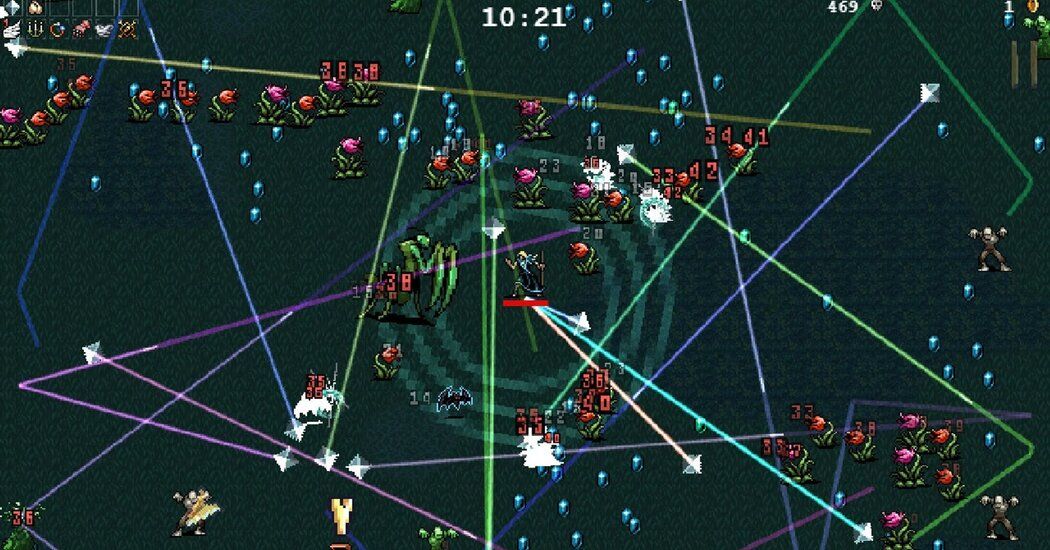With the help of rings of lightning, garlic, and Bibles, players survived waves of demons and beasts in Vampire Survivors long before the video game was officially released.
Vampire Survivors became a word-of-mouth success during its early access period, an increasingly popular alternative to the traditional development cycle. In early access periods, studios sell an unfinished product (often at full price) to highly engaged players who can provide valuable feedback and a crucial revenue stream.
Luca Galante, the creator of Vampire Survivors, had originally planned to include 12 characters, five stages, and about 40 weapons in the game. When its 10-month early access period ended in October 2022, there were 40 characters, 10 stages, and 74 weapons for players to discover.
“Vampire Survivors started as a hobby project and I had a much smaller scope in mind,” Galante said. “I felt very encouraged and buoyed by the positive reception.”
Movies have long been shown to small audiences in test screenings, allowing studios to cut jokes that don’t work or rewrite unsatisfying endings. But in the video game industry, early access titles are available to anyone who is interested.
“If you want to know that your game is bad, you want to know as soon as possible so you can do something about it, and not when it’s too late,” said Swen Vincke, CEO of Larian Studios. , which released the acclaimed role-playing game Baldur’s Gate 3 in August after spending nearly three years in Early Access.
Only the first of Baldur’s Gate 3’s three narrative acts was playable during Early Access. When the game was fully released, it included new races and subclasses, as well as dozens of never-before-seen spells.
Early access periods can yield considerable benefits, including additional financial resources for studios to complete or expand a game.
Hibernian Workshop used the $500,000 it earned from 19 months of early access sales to support the full launch of fantasy roguelite Astral Ascent in November. Like the hit game Hades, which spent nearly two years in early access, players accumulate abilities over time to fight in a randomized landscape.
“Without this, we would have needed to make a much smaller game,” Louis Denizet, lead designer of Astral Ascent, said of early sales.
Denizet said that Hibernian learned during early access that it no longer had full control of the creative process, so it reworked several systems to meet player expectations. Based on community feedback, the studio improved the game’s interface and remade the portraits of 28 characters in animated pixel art.
The benefits of early access for smaller games like Astral Ascent may be even greater because quality control (the process by which technical errors are identified and fixed) is a difficult and expensive part of game development.
“Having thousands of people give feedback on their experience while early access lasts is priceless,” Denizet said.
Making modifications can be a balancing act. A game that changes drastically in Early Access may frustrate players who thought they were buying a different product, but failing to take advantage of feedback may defeat the purpose of deviating from the traditional development cycle.
It’s easier to set expectations with a smaller audience, said Snutt Treptow, a programmer and community manager at Coffee Stain Studios who works on Satisfactory, a factory simulation game that has been in early access since 2019. Players were delighted to seeing the studio add pipes, a request that had become a community meme, in one of Satisfactory’s biggest updates.
An indie developer can convincingly promise players that they need to support an unfinished game to improve the final product. A studio with a huge budget may not have the same leeway.
Some genres also fit the early access model better.
Narrative games with a clear beginning, middle, and end could be considered incomplete and subject to negative reviews if released early. Open games with replayability are generally a smarter bet, said Jonathan Smars, lead engineer on Valheim, a popular survival sandbox game that spent two years in early access.
Big-budget titles known as AAA games, he said, tend to have a very clear vision and target audience in mind. “But maybe if some AAA studios adopted a more independent mindset, they would end up making better games,” she said.
The multiplayer survival game Grounded, in which shrunken players navigate a backyard filled with predatory insects, was always intended to be an early access title, said Adam Brennecke, game director at Obsidian Entertainment. The studio saw the success of other survival games like Subnautica and The Forest, he said, and based the development of Grounded on those early access models.
“Early access is a great way to develop games because you have a better chance of getting it right,” Brennecke said. “Developing a game is an iterative process of finding the fun, and the more iterations you have, the better the game will be.”












